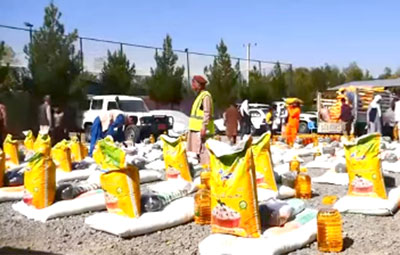An OCHA director in the operations and advocacy division, Reena Ghelani, said the organization has established a new system to monitor the humanitarian aid process in order to prevent corruption.
Reena Ghelani, who is leading a nine-member delegation of the UN, which has arrived in Kabul to monitor the distribution of humanitarian aid, made the remarks in a special interview with TOLOnews.
She said that they are working with 180 Afghan and international organizations to conduct a transparent aid process.
Ghelani urged the international community to support the people of Afghanistan.
“Absolutely, the United Nations and its partners—its NGO partners—we have asked for $4.4 billion dollars, which we do not have yet, we need to raise this money because we need to urgently get assistance to people. We saw horrible nutrition…. We saw children begging to go to school, both boys and girls,” she said.
A member of the delegation said that there is a need to work with the local communities and organizations to provide aid for the people.
“We urge the Biden administration to work in close collaboration with (the) Afghans, especially women and local organizations…” she said.
This comes as many Afghans have voiced concerns over what they called the unfair distribution of aid.
What are the necessary steps to be taken for countering corruption in the distribution of aid?
“If the aid was provided in cash, it would help the value of the Afghan currency and would solve the cash problems in the markets,” said Abdul Naseer Rishtia, a university professor.
“The government should assess the aid provided by the UN. The contracts of the UN organizations should be shared (with the government) and the government must investigate it to see if the aid is provided to the people who deserve it,” said Muzamil Shinwari, an economist.
Afghanistan has recently seen a dire humanitarian crisis with millions of people struggling with starvation.
Meanwhile, the United Nations Children’s Fund (UNICEF) highlighted the severe condition of Afghan children and estimated that “one in two children under five will be acutely malnourished in 2022 due to the food crisis and poor access to water, sanitation and hygiene services.”
“Children across Afghanistan are increasingly vulnerable to disease and illness due to the deadly combination of rising malnutrition, an unprecedented food crisis, drought, disruptions to vital health and nutrition centers, lack of access to and poor quality of water and sanitation services, and crippling winter weather,” UNICEF said in a recent report.
As Afghanistan is overwhelmed with a drastic crisis that has affected the country in a variety of ways, the humanitarian organization has repeatedly voiced concerns over the situation of the people.
“You see the number of malnourished children is rising. The surge in malnutrition is not the (challenges) of the past two or three months…it may be because they could not come to us. Maybe people have not had jobs to bring food,” said Dr. Mohammad Sadeq, head of the Mirwais Hospital in southern Kandahar province.
The UNICEF said that more than 66,000 cases of measles have thus far been reported in 2021 in Afghanistan.
“There have also been outbreaks of acute watery diarrhoea, malaria and dengue fever. Four cases of wild poliovirus type 1 (WPV-1) have been confirmed this year,” the report said.
“We are approaching a critical juncture for Afghanistan’s children, as winter brings with it a multitude of threats to their health,” said Abdul Kadir Musse, UNICEF Afghanistan Representative, as quoted in the report.
“There is no time to lose. Without urgent, concerted action – including ensuring we have the resources to deploy additional cash transfers and winter supplies – many of the country’s children will not live to see spring.”
The Ministry of Public Health promised to improve the health system in the country.
“The Ministry of Public Health is trying to improve the health sector so the number of malnourished children can drop,” said Javid Hajir, a spokesman for the ministry. “We also launched a campaign of public awareness.”—Tolonews










